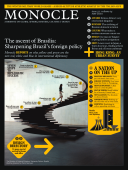
Issue 33
Monocle’s May issue looks at the ascent of Brasília – why yellow and green are the new red, white and blue in international diplomacy.
In This Issue
Oops! No content was found.
Looks like we no longer have content for the page you're on. Perhaps try a search?
Return Home

